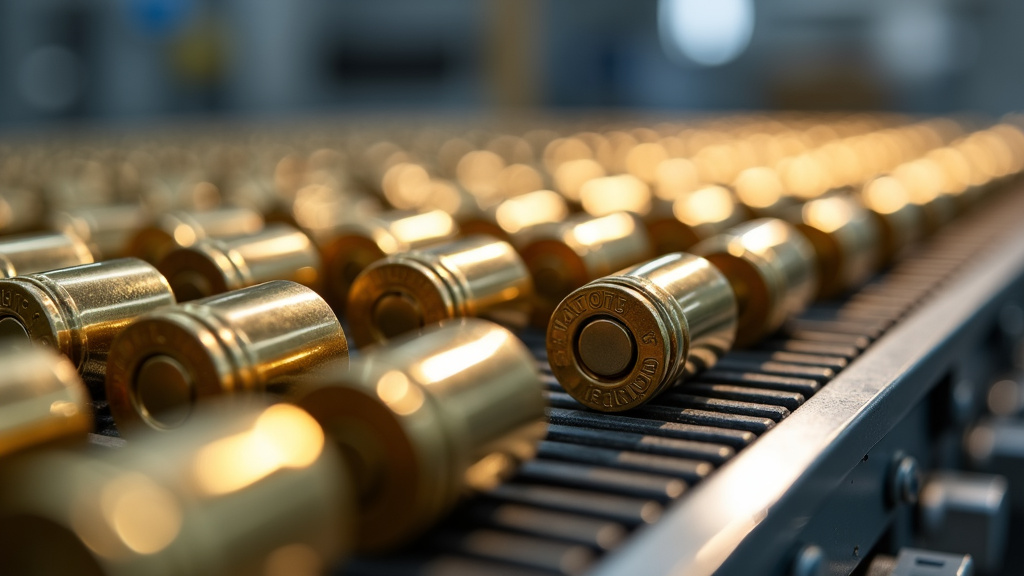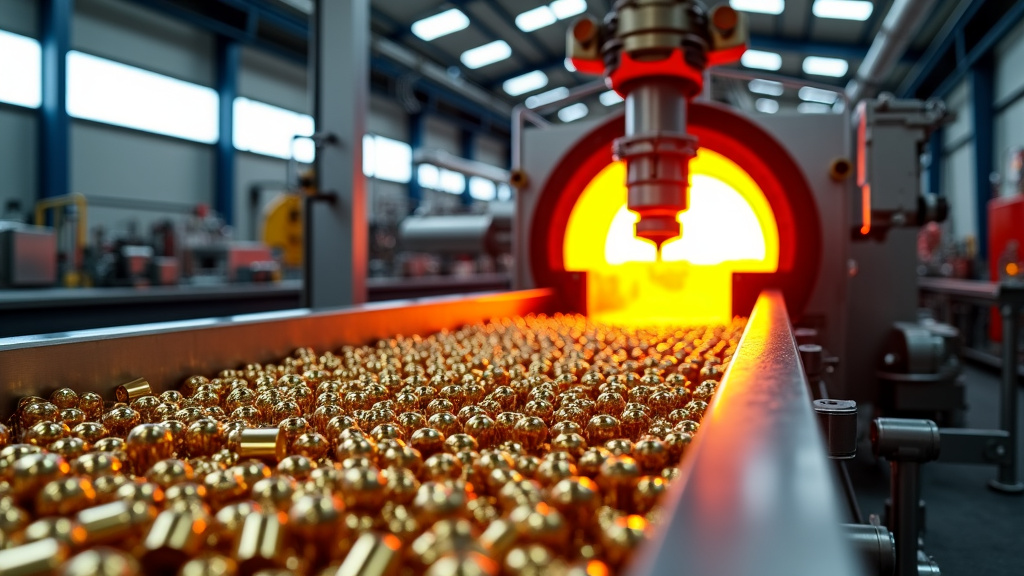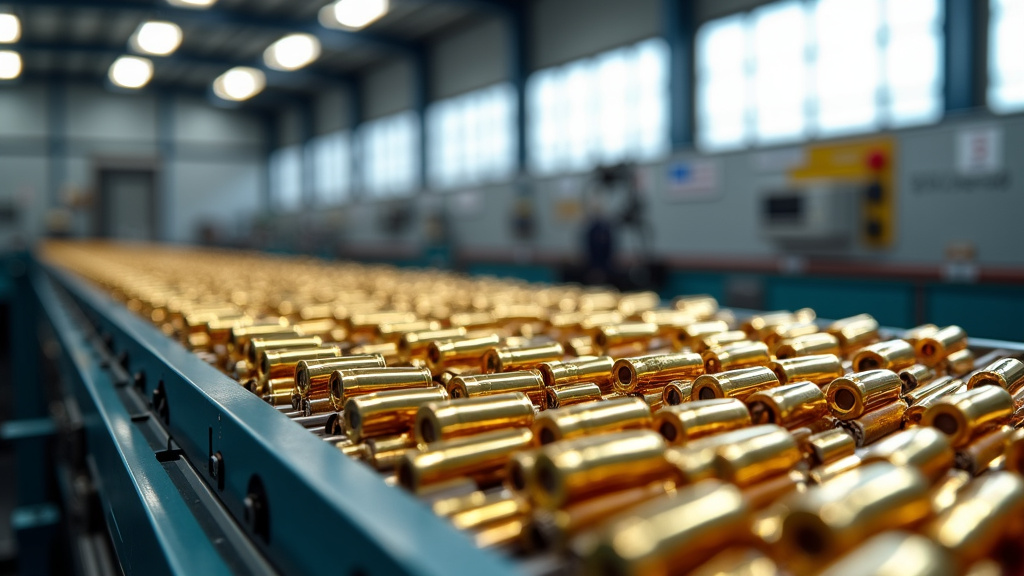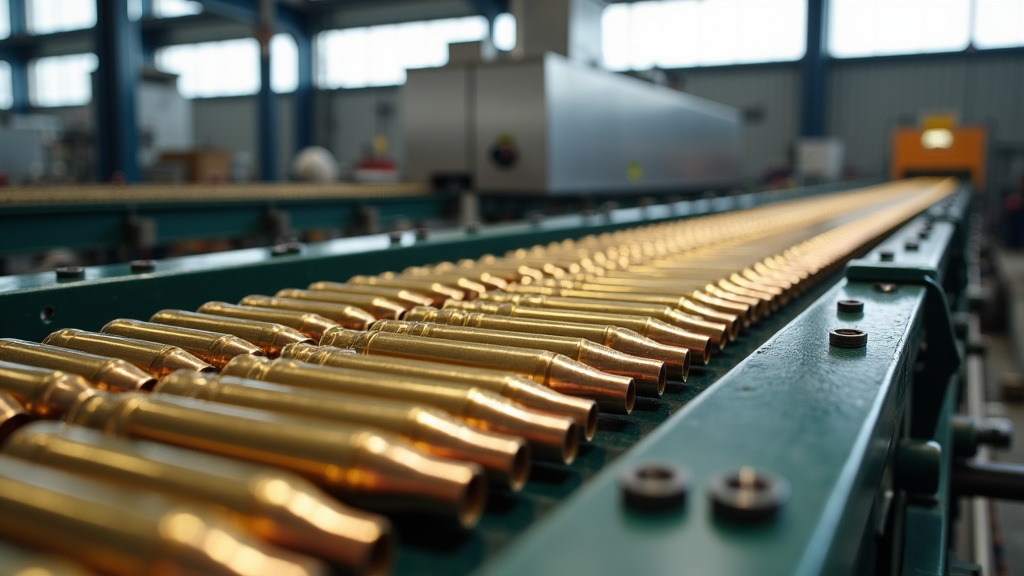5901 Botham Jean Blvd, Dallas, TX 75215
Companies That Recycle Scrap Brass Shells
March 21, 2025Recycling brass shell casings can save up to 90% of the energy required to produce new brass from raw materials. This highlights the importance of companies that recycle scrap brass shells in our quest for sustainable metal management.
As environmental awareness aligns with economic pragmatism, recycling brass shell casings exemplifies industrial innovation. These companies are not merely processing metal; they are pioneering a circular economy that offers both ecological and financial benefits.
From small-scale operations to industry leaders, businesses specializing in brass shell recycling are transforming waste into valuable resources. Their innovative processes conserve natural reserves of copper and zinc and significantly reduce the carbon footprint associated with brass production.
In exploring brass shell recycling, we’ll examine the intricate processes these companies use, the environmental impact of their work, and the economic ripple effects that extend beyond the recycling plant. Whether you’re an environmentally conscious consumer or a business owner looking to optimize waste management, understanding the role of these recyclers is crucial in today’s sustainability-focused landscape.
Join us as we reveal the potential within spent brass shells and discover how forward-thinking companies are transforming yesterday’s ammunition into tomorrow’s resources. The journey of brass shell recycling is not just about metal—it’s about creating a more sustainable future for generations to come.
The Importance of Recycling Scrap Brass Shells

With environmental awareness becoming increasingly important, recycling scrap brass shells is a crucial practice with significant benefits. This often-overlooked aspect of waste management plays a vital role in conserving resources, reducing landfill use, and promoting a circular economy. Here’s why recycling these metallic remnants is not just a responsible choice but essential for our planet’s future.
Brass shell recycling is a beacon of hope in sustainable resource management. According to the Institute of Scrap Recycling Industries (ISRI), recycling metals can cut greenhouse gas emissions by 300 to 500 million tons. This figure highlights the profound impact of recycling brass shells, primarily composed of copper and zinc—two highly valuable and finite resources.
The environmental benefits of recycling brass shells go beyond emission reduction. Diverting these materials from landfills not only saves space but also prevents potential soil and groundwater contamination. The U.S. Environmental Protection Agency (EPA) states that recycling one ton of metal can save 1.5 tons of solid waste from reaching landfills. Imagine the impact if we consistently recycled all our brass shells!
Conservation of Natural Resources
One compelling argument for brass shell recycling is its role in conserving finite resources. The extraction of copper and zinc involves environmentally destructive mining practices that disturb landscapes and produce hazardous waste. By recycling brass shells, we significantly reduce the need for virgin mining, preserving these resources for future generations.
Moreover, recycling brass saves substantial energy. The recycling process uses up to 90% less energy compared to producing new brass from raw materials. This dramatic energy reduction directly lowers carbon emissions, contributing to global efforts to combat climate change.
To put this into perspective, recycling one ton of brass conserves approximately 2,500 pounds of copper ore and 500 pounds of zinc ore. These figures highlight the immense potential of brass shell recycling in preserving our natural resources and reducing our ecological footprint.
Economic Advantages of Brass Shell Recycling
Beyond environmental benefits, brass shell recycling offers significant economic advantages. The brass recycling industry creates jobs, stimulates local economies, and provides a cost-effective source of raw materials for manufacturers. The U.S. scrap recycling industry generates over $110 billion in economic activity annually, demonstrating the substantial economic potential of recycling practices.
For individuals and businesses, recycling brass shells can be financially rewarding. Many recycling facilities offer competitive prices for brass scrap, turning what was once considered waste into a valuable commodity. This economic incentive encourages more widespread recycling and helps offset the costs of proper waste management.
Furthermore, using recycled brass in manufacturing can reduce production costs. This cost-saving benefit can be passed on to consumers, making products more affordable while supporting environmentally friendly practices.
Promoting a Circular Economy
A crucial aspect of brass shell recycling is its role in fostering a circular economy. Unlike the traditional linear economy model of “take-make-dispose,” a circular economy aims to keep resources in use for as long as possible, extract maximum value, and then recover and regenerate products and materials at the end of their service life.
Brass is uniquely suited for this circular model due to its infinite recyclability without loss of quality or performance. Every brass shell recycled represents a step towards closing the loop in our resource utilization, reducing waste, and minimizing reliance on virgin materials.
By embracing brass shell recycling, we’re not just disposing of waste more efficiently; we’re fundamentally reimagining our relationship with resources. This shift towards a circular economy can create more resilient supply chains, reduce environmental pressures, and drive innovation in product design and manufacturing processes.
In conclusion, the importance of recycling scrap brass shells cannot be overstated. From conserving natural resources and reducing greenhouse gas emissions to stimulating economic growth and promoting a circular economy, the benefits are manifold and far-reaching. As we face resource scarcity and environmental degradation challenges, every recycled brass shell represents a small but significant victory in our quest for a more sustainable future. It’s time we recognize the value in what we once considered waste and embrace the transformative power of recycling.
The Brass Shell Recycling Process

Recycling brass shells is a detailed process that blends traditional metallurgy with modern technology. This eco-friendly practice conserves valuable resources and reduces the environmental impact of metal production. Let’s examine the step-by-step journey of a spent brass shell as it transforms from waste to a valuable resource.
1. Collection and Sorting
The process begins with collecting spent brass shells from sources like shooting ranges, military facilities, and ammunition manufacturers. Once collected, these shells undergo a meticulous sorting process. Advanced technologies, such as AI-powered sorting systems, enhance accuracy and efficiency.
These intelligent systems use cameras and sensors to identify different types of brass alloys, ensuring that only compatible materials are processed together. This precise sorting is crucial for maintaining the quality of the recycled brass and optimizing subsequent recycling steps.
2. Cleaning and Decontamination
Before the brass shells can be melted, they must be thoroughly cleaned to remove contaminants. This step is critical, as impurities can affect the quality of the recycled metal. The shells are typically washed in specialized solutions to remove dirt, gunpowder residue, and debris.
In some cases, advanced decontamination techniques are used. For instance, ultrasonic cleaning methods ensure even the smallest particles are removed from the brass shells. This meticulous cleaning process improves the quality of the recycled brass and enhances worker safety by eliminating hazardous residues.
3. Shredding and Size Reduction
Once cleaned, the brass shells are fed into industrial shredders, breaking them into smaller, more manageable pieces. This size reduction increases the brass’s surface area, making the melting process more efficient and allowing easier handling and transportation.
Modern shredding equipment is designed to handle the toughness of brass while minimizing energy consumption. Some facilities even employ smart shredding systems that adjust their operation based on the specific characteristics of the brass, further optimizing the recycling process.
4. Melting and Purification
The shredded brass is then melted in high-temperature furnaces. This stage is where the true transformation occurs, as the solid metal becomes molten. During this process, any remaining impurities rise to the surface as slag, which is skimmed off to ensure the purity of the recycled brass.
Innovative technologies make this stage more efficient and environmentally friendly. Some facilities use induction furnaces that offer precise temperature control and reduce energy consumption. Advanced filtration systems capture and treat emissions, minimizing the environmental impact of the melting process.
5. Alloying and Quality Control
Once melted, the brass may be combined with other metals to achieve specific alloy compositions. This step allows recyclers to produce brass with properties tailored to various applications. Sophisticated spectrometers analyze the molten metal in real-time, ensuring the final product meets exact specifications.
Quality control is paramount at this stage. Samples are subjected to rigorous testing to verify the composition, strength, and other critical properties of the recycled brass. This attention to detail ensures the recycled metal meets or exceeds industry standards, making it suitable for a wide range of applications.
6. Casting and Forming
The final step involves casting the molten brass into various forms, such as ingots, bars, or sheets. These standardized shapes facilitate transport and use in new manufacturing processes. Some facilities have invested in advanced casting technologies that allow for near-net-shape components, reducing waste and energy consumption in subsequent manufacturing steps.
| Stage | Description |
| Collection | Gathering spent brass shells from sources like shooting ranges and military facilities. |
| Sorting | Advanced AI-powered systems sort shells to ensure only compatible materials are processed together. |
| Cleaning | Shells are washed to remove dirt and residues; advanced methods like ultrasonic cleaning may be used. |
| Shredding | Shells are broken into smaller pieces to increase surface area for efficient melting. |
| Melting | Shredded brass is melted in high-temperature furnaces, with impurities skimmed off as slag. |
| Alloying | Brass may be combined with other metals for specific properties; quality control ensures standards are met. |
| Casting | Molten brass is cast into ingots, bars, or sheets for transport and use in manufacturing. |
By embracing these innovative recycling technologies, the brass industry conserves valuable resources and reduces its environmental footprint. As advancements continue, the future of brass recycling looks promising, offering a more sustainable and circular approach to metal production.
How Okon Recycling Can Help with Companies That Recycle Scrap Brass Shells

In the intricate world of metal recycling, few companies match the expertise of Okon Recycling. Established in 1909, this Dallas-based leader has been at the forefront of sustainable metal management for over a century. Their specialized solutions for scrap brass shell recycling demonstrate a commitment to innovation as enduring as the metals they process.
Brass shells, once expended, are a valuable resource that requires careful handling. Okon Recycling’s approach to recycling these shells is meticulous. They have refined their processes to extract maximum value while adhering to strict environmental standards. This is not just recycling; it’s about reimagining the lifecycle of metals.
What sets Okon apart in scrap brass recycling is their holistic view of sustainability. They see brass shells not as mere scrap but as part of a larger ecosystem of metal resources, integrating recycling into a broader strategy of resource conservation and environmental stewardship.
Innovative Solutions for Brass Shell Recycling
Okon Recycling’s facility showcases their commitment to technological advancement. Spanning 20 acres, their modern plant houses state-of-the-art equipment designed for processing diverse metal waste, including brass shells. This technological investment translates to higher efficiency and purity in the recycled materials they produce.
The company’s expertise extends beyond processing. They offer comprehensive services, including collection, sorting, and processing of both ferrous and non-ferrous materials. For businesses dealing with scrap brass shells, this means a one-stop solution for every aspect of the recycling process.
Okon’s approach to brass shell recycling is deeply rooted in sustainability. Their processes reclaim valuable metals while minimizing environmental impact, making them a preferred partner for companies seeking to enhance their environmental credentials.
A Century of Experience Meets Modern Sustainability
Okon Recycling’s longevity in the industry reflects their adaptability and foresight. Over the decades, they have evolved practices to meet changing environmental regulations and industry standards, ensuring that their brass shell recycling solutions remain at the forefront of sustainability.
A unique aspect of Okon’s service is their ability to customize recycling solutions. They understand that each company’s needs are different, particularly with specialized materials like brass shells. Their team works closely with clients to develop tailored recycling programs that align with specific operational needs and sustainability goals.
Transparency is another cornerstone of Okon’s approach. They provide clients with detailed reports on recycling activities, offering clear insights into the environmental impact of their efforts. This openness builds trust and helps companies track progress towards sustainability targets.
Beyond Recycling: Creating Value from Waste
Okon Recycling’s vision extends beyond recycling. They see scrap brass shells as part of a larger circular economy. By reclaiming these materials, they are not just preventing waste but creating new resources for various industries, from manufacturing to construction.
The company’s commitment to innovation is evident in their continuous research into new recycling techniques. They are constantly exploring ways to extract more value from scrap materials, including brass shells, ensuring that clients always benefit from the most advanced recycling solutions available.
Okon’s expertise in handling diverse metal waste makes them particularly well-suited for companies dealing with mixed metal scrap. Their ability to process and segregate different types of metals ensures that each material, including brass shells, is recycled efficiently and environmentally friendly.
A Partner in Sustainable Business Practices
For companies looking to enhance their sustainability credentials, partnering with Okon Recycling offers more than just a waste management solution. It is an opportunity to be part of a larger movement towards sustainable resource management. Okon’s century-long commitment to recycling underscores the viability and importance of long-term sustainable practices.
The company’s approach to customer service is as robust as their recycling capabilities. They offer comprehensive support, from initial consultation to ongoing management of recycling programs, ensuring that companies can seamlessly integrate sustainable brass shell recycling into their operations.
In an era where environmental responsibility is crucial, Okon Recycling stands out as a beacon of sustainable practices. Their specialized solutions for scrap brass shell recycling address immediate waste management needs and contribute to a broader vision of a sustainable, circular economy.
Companies partnering with Okon for their brass shell recycling needs aren’t just solving a waste management problem; they are investing in a sustainable future. With Okon’s expertise, advanced facilities, and commitment to innovation, businesses can transform their scrap brass shells from a liability into an asset, contributing to a more sustainable world.
As industries evolve and environmental concerns take center stage, Okon Recycling’s role in shaping sustainable practices becomes increasingly vital. Their century of experience, combined with a forward-looking approach to recycling, positions them as not just a service provider but a crucial partner in the journey towards a more sustainable industrial landscape.
The Future of Scrap Brass Shell Recycling

The future of scrap brass shell recycling is promising, playing a crucial role in sustainable metal management with significant environmental and economic benefits. Diverting brass shells from landfills conserves natural resources, reduces energy consumption, and lessens metal production’s environmental impact.
Innovation is propelling the industry forward, with companies like Okon Recycling leading in developing efficient, sustainable recycling practices. Advanced sorting technologies and improved processing methods are making brass shell recycling more cost-effective.
Industry collaboration is vital for advancing sustainable metal recycling. Partnerships between recyclers, manufacturers, and environmental organizations foster knowledge sharing and best practice development, essential for overcoming challenges and seizing opportunities in metal recycling.
We all play a role in supporting sustainable recycling practices. By recycling brass shells and other metal waste, we contribute to a circular economy that values resources and reduces waste. The future of scrap brass shell recycling relies on our collective commitment to sustainability.
To be part of this sustainable future, consider partnering with experienced recyclers like Okon Recycling. Their expertise and dedication to environmental stewardship ensure responsible recycling of brass shells and other metal waste. For more information or to start your recycling journey, contact Okon Recycling at 214-717-4083. Together, we can build a more sustainable future for metal recycling and our planet.
